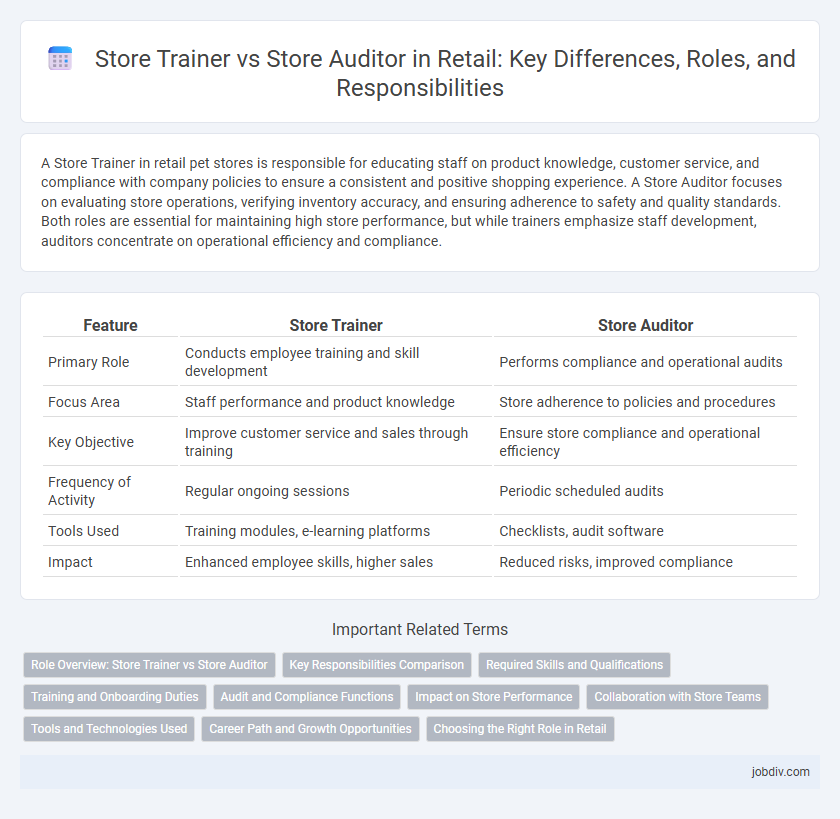A Store Trainer in retail pet stores is responsible for educating staff on product knowledge, customer service, and compliance with company policies to ensure a consistent and positive shopping experience. A Store Auditor focuses on evaluating store operations, verifying inventory accuracy, and ensuring adherence to safety and quality standards. Both roles are essential for maintaining high store performance, but while trainers emphasize staff development, auditors concentrate on operational efficiency and compliance.
Table of Comparison
| Feature | Store Trainer | Store Auditor |
|---|---|---|
| Primary Role | Conducts employee training and skill development | Performs compliance and operational audits |
| Focus Area | Staff performance and product knowledge | Store adherence to policies and procedures |
| Key Objective | Improve customer service and sales through training | Ensure store compliance and operational efficiency |
| Frequency of Activity | Regular ongoing sessions | Periodic scheduled audits |
| Tools Used | Training modules, e-learning platforms | Checklists, audit software |
| Impact | Enhanced employee skills, higher sales | Reduced risks, improved compliance |
Role Overview: Store Trainer vs Store Auditor
Store Trainers specialize in developing and delivering comprehensive training programs to enhance employee skills, product knowledge, and customer service standards within retail environments. Store Auditors focus on evaluating store operations by conducting inspections and assessments to ensure compliance with company policies, financial accuracy, and operational efficiency. Both roles are critical for maintaining high-performance standards, with Trainers driving workforce development and Auditors ensuring procedural adherence.
Key Responsibilities Comparison
Store trainers develop and implement comprehensive training programs to enhance employee skills, product knowledge, and customer service standards. Store auditors conduct thorough inspections and evaluations of store operations, ensuring compliance with company policies, inventory accuracy, and loss prevention measures. Both roles play a critical part in driving operational excellence and improving overall store performance.
Required Skills and Qualifications
Store Trainers require strong communication skills, in-depth product knowledge, and the ability to conduct engaging training sessions that enhance employee performance and customer service. Store Auditors need expertise in compliance standards, attention to detail, analytical skills, and proficiency in audit software to ensure operational accuracy and adherence to company policies. Both roles demand a solid understanding of retail operations, but Store Trainers emphasize teaching and mentorship, while Store Auditors focus on inspection and reporting.
Training and Onboarding Duties
Store Trainers specialize in designing and delivering comprehensive training programs to onboard new employees efficiently, ensuring consistent knowledge of product features, sales techniques, and store policies. Store Auditors primarily evaluate the effectiveness of training implementation by monitoring employee compliance and performance against established standards during their onboarding period. Both roles contribute to enhancing staff readiness, but Store Trainers focus on direct skill development while Store Auditors emphasize quality assurance and adherence to operational protocols.
Audit and Compliance Functions
Store Trainers focus on educating employees about operational standards, product knowledge, and customer service best practices, ensuring staff compliance through ongoing training sessions. Store Auditors specialize in conducting thorough compliance audits, verifying adherence to company policies, regulatory requirements, and merchandising standards to maintain operational integrity. Audit and compliance functions intersect as auditors identify gaps that trainers address through targeted coaching, fostering a culture of continuous improvement in retail environments.
Impact on Store Performance
Store Trainers enhance store performance by improving employee skills, boosting customer service quality, and increasing sales through consistent and effective training programs. Store Auditors impact store performance by ensuring compliance with operational standards, identifying areas for improvement, and reducing losses through detailed inspections and reporting. Both roles complement each other by driving operational excellence and sustainable business growth in retail environments.
Collaboration with Store Teams
Store Trainers collaborate closely with store teams by providing hands-on coaching, skill development, and performance feedback to enhance employee capabilities and customer service standards. Store Auditors work alongside store teams to ensure compliance with operational procedures, identify areas for improvement, and verify adherence to corporate policies, fostering a culture of accountability. The collaboration between Store Trainers and Auditors supports continuous improvement by aligning training initiatives with audit findings, driving operational excellence and consistent store performance.
Tools and Technologies Used
Store Trainers leverage learning management systems (LMS), interactive e-learning platforms, and mobile training apps to deliver consistent retail education and monitor employee progress. Store Auditors utilize point-of-sale (POS) analytics, inventory management software, and audit reporting tools to ensure compliance, detect discrepancies, and optimize store operations. Both roles rely on data-driven technologies, but Trainers focus on skill development while Auditors emphasize operational accuracy.
Career Path and Growth Opportunities
Store Trainers develop employee skills and operational excellence, positioning themselves for leadership roles in retail management or corporate training departments. Store Auditors focus on compliance, risk management, and financial accuracy, paving the way for careers in internal audit, risk control, or retail finance management. Both roles offer distinct growth opportunities, with Trainers advancing through talent development and operational leadership, while Auditors progress toward specialized roles in audit or corporate governance within retail organizations.
Choosing the Right Role in Retail
Store trainers specialize in employee development, focusing on enhancing staff skills and product knowledge to improve customer service and sales performance. Store auditors concentrate on compliance and operational efficiency by conducting thorough inspections of inventory, cash handling, and merchandising standards. Choosing the right role depends on whether the priority is boosting team capabilities through training or ensuring adherence to retail policies and procedures for smooth store operations.
Store Trainer vs Store Auditor Infographic

 jobdiv.com
jobdiv.com